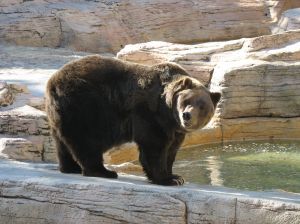Camping Safety: Bears and You
All campsites should be set up with basic animal safety in mind, but if you’re tent camping in bear country, you need to be aware of some important precautions. Though bears are surprisingly gentle creatures, the American black bear can be six feet long and close to 500 pounds – and they’re the smaller ones. Also, not all bears hibernate, so camping in the winter is no guarantee your camp grounds can’t be visited by a bear.
That said, the danger from bears is often exaggerated and sensationalized. Lucky for us, bears aren’t “looking for trouble” any more than any other forest creature; and many, if not most, dangerous bear encounters are provoked by human behavior. Likewise, bear encounters can be minimized by human behavior. That’s where we come in.
Bear Safety 101
There are a few things you can do right off the bat to make camping in bear habitat safer. Awareness is the name of the game, and with a little forethought, there’s no reason to assume you’ll ever be harassed by a bear. Here are the major things to know.
Be aware that you’re in “bear country.“ Warnings to this effect are fairly abundant in established camp grounds, but of course, if you’re in the backcountry you need to know the terrain and your surroundings. A bear should never be a surprise.
Control your domestic animals. A loose dog is an invitation for your local bear. If you are bringing a dog, cat, or other domesticated animal, be extra certain he or she remains on a leash and under control at all times. If a dog goes wandering, it might easily lead a bear home to you, endangering you, your pet, and the unsuspecting bear.
Be aware of your food and waste. In this situation, it’s even more important to “leave no trace.” The scent of food is just as enticing to bears as it is to people. Don’t leave food out or bury it; any leftovers should be stored safely in bear-proofed containers or kept in vehicles. When cooking, do so a safe distance downwind from your established campsite. Bears may not see well, but they have an exceptional sense of smell.
If confronted, know your options ahead of time. Outrunning a bear over any distance is impossible, and climbing a tree is only advisable if you’re sure you can cover a good vertical distance in only a few seconds. Just as if you were approached by an unfamiliar dog, you don’t want to project fear or provoke the animal’s hunting instincts. Most bears are interested only in your food. If you remain calm and stand pat, the bear is likely to leave on its own. Only if the bear persists in approaching you should you “play dead.”
Know your camp grounds’ rules on weapons. In some parks it’s acceptable to carry firearms for protection or while hunting. As always, guns should only be handled by experienced and responsible marksmen. Once you take the responsibility of bringing a weapon onto a campsite, you have to be just as aware of the other people around you as you are of the bears and other animals who may be close by.
Because of their size and fierce reputation, bears are often misunderstood. Thankfully, when it comes to campers and bears, there’s plenty of room in the wild for the both of us.



Great article and I agree there is plenty of room for bears and us to enjoy together. That being said, as one who has experienced a close encounter with a bear, it is recommended to have a bear repellant spray in the event you may need it. Bear spray is constructed of cayenne pepper in 18% concentration. This is enough to likely cause the bear to re-consider it thinking and will not cause long term effects.
Comment by StunTech Self Defense Products — June 25, 2010 @ 3:01 pm